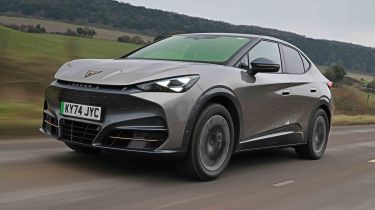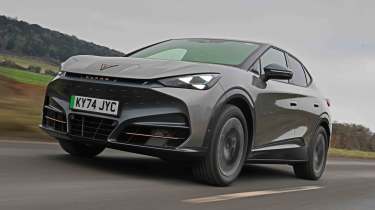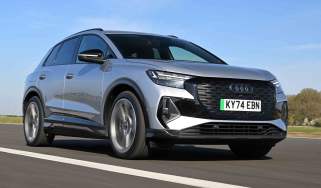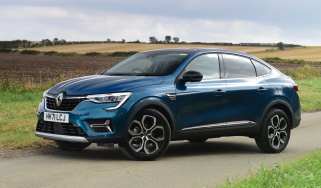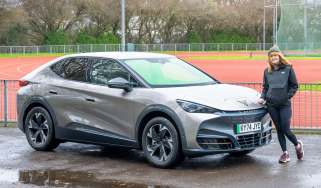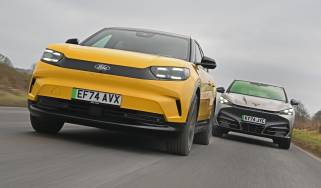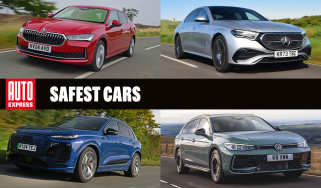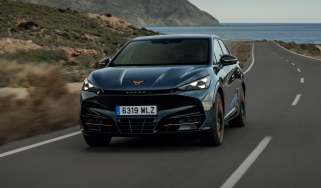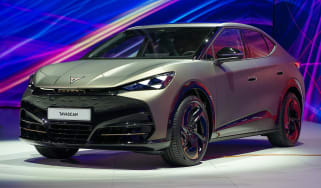Cupra Tavascan review
Stylish Cupra Tavascan SUV joins its Born sibling to extend Spanish brand’s line-up of electric vehicles
Our opinion on the Cupra Tavascan
If you want an electric family car that stands out from the crowd, then the Cupra Tavascan is it. The head-turning looks don’t come at the expense of practicality, either, because there’s plenty of space inside for passengers and luggage.
While Cupra is a sporting brand, the Tavascan isn’t quite the leading light of the class for sporty handling - that award goes to the Ford Explorer and Ford Capri twins - while the firm ride and inconsistent brakes are two minus points for the Spanish model. And then there’s the price, which is high when compared with rivals in the class that are equally capable.
| Key specs | |
| Fuel type | Electric |
| Body style | Coupe/Crossover |
| Powertrain | 77kWh battery, 1x e-motor, rear-wheel drive 77kWh battery, 2x e-motors, four-wheel drive |
| Safety | 5-stars (Euro NCAP, 2024) |
| Warranty | 5yrs/90,000 miles |
About the Cupra Tavascan
Compared with other brands in the Volkswagen Group, Cupra has turned up pretty late to the all-electric SUV party. While VW, Skoda and Audi have offered a car in the compact SUV class for some time, SEAT’s sporty offshoot has had to make do with just the Cupra Born hatchback until now, with the arrival of the Tavascan. Still, given the patchy reception to some of those earlier MEB-platform cars when they arrived, it has provided Cupra with time to learn from previous shortcomings and create a more rounded package – at least in some areas.
The Tavascan is a five-door, five-seat family car that we’d describe more as a coupe-SUV than a full SUV, courtesy of its swoopy styling. It’s the largest car in the Cupra line-up - bigger even than the recently launched, combustion-engined Terramar - and it’s priced quite high, too, with the range kicking off at around £47,500.
That gets you behind the wheel of the V1 model, which features a 77kWh battery connected to a 282bhp electric motor that drives the rear wheels. This powertrain is also offered in V2 trim for an extra £6,000 over V1. Two motors are fitted to the VZ1, which starts from around £56,000, so there is four-wheel drive and a total power output of 335bhp. The top-spec model is the VZ2, which adds £6,000 to the VZ1’s price. Both of these models feature the same 77kWh battery as the V1 and V2 models.
Performance & driving experience
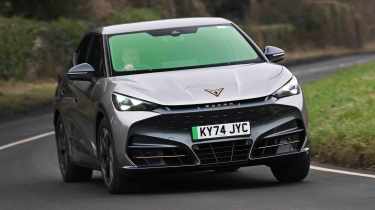
| Pros | Cons |
|
|
The Tavascan’s powertrains are impressive, but the choice is more limited than in some other alternatives in this segment. With no entry-level model offered in the vein of the 168bhp option available in the Ford Capri or Explorer (two cars that use the same running gear as the Tavascan), the Cupra’s base price is high. Instead, the range kicks off with a single-motor model which sends a healthy 282bhp to the rear wheels, while the 4Drive model has (as the name suggests) four-wheel drive, plus 335bhp from its twin-motor set-up. You pay for this performance, though, with the top-spec version of the Tavascan costing more than £60,000.
Electric motors, 0-60mph acceleration and top speed
The Tavascan fitted with a rear-mounted electric motor has more than enough performance – more than most buyers will need, in fact. The 0-62mph sprint takes 6.8 seconds, so few buyers will require the 335bhp option.
Those who do will get some serious straight-line shove, though, with the instant torque – all 545Nm of it – deployed to the road via all four wheels to deliver a 0-62mph time of 5.5 seconds. That’s only a few tenths shy of Cupra’s fastest petrol-powered performance cars, but with no gearbox to contend with, it feels even quicker in many driving situations. Both versions of the Cupra Tavascan are limited to a top speed of 112mph.
Town driving, visibility and parking
Keen handling and a smooth powertrain impress, but in some situations the ride is a little too sporty, and the calibration of the brakes needs some work. Around town there’s a firmness to the damping in the Tavascan, which certainly sets its stall out as one of the more sporting options in this segment. The damping is better than on some contenders, though, and it doesn’t have the slightly brittle feeling you get from a Kia EV6. This is because the Cupra’s springs and dampers are better at taking the edge off the harshest bumps.
We have two caveats here, however: our time behind the wheel in the UK has been in a car on 19-inch wheels, the smallest available, and also we’re yet to try the Tavascan with adaptive dampers in the UK. Larger wheels can make the ride more fidgety, while our experience with the adaptive dampers on the Tavascan on smoother European roads saw a marked change to the car’s demeanour as the ride tightened up significantly in the Performance and Cupra settings.
B-road driving and handling
Much like in the smaller Born electric hatchback, one of the Tavascan’s main weaknesses is the feedback through the brake pedal. Initially, this gives quite a firm, positive response, but press harder and there seems to be a centimetre or two of travel where everything feels a bit soft and very little extra deceleration happens. A firmer shove brings back some more bite as the mechanical brakes chip in, but the transition between the motor regeneration and the interaction between discs and calipers is a little clumsy and not very reassuring.
It’s a shame, because elsewhere the Cupra feels decent to drive. The steering is light and precise, and the rear-wheel-drive model is sweetly balanced, capable of pushing the car gently through a turn as power is applied. You can never truly get away from the car’s weight, but there is fun to be had on the right road.
Motorway driving and long-distance comfort
It’s on the motorway where we’d wish for just a slightly more compliant suspension set-up. Here, there is still some fidgeting, giving the impression that the Tavascan never truly settles down.
That aside, the spacious cabin helps the motorway miles to slip by with little effort. There’s more than enough power to make accelerating along slip roads and inclines – and overtaking manoeuvres – feel effortless. It was very rare that we felt the need to explore the full travel of the throttle pedal on our test drive.
Expert view, on driving experience
“Out on the road, the good points of the Tavascan’s MEB platform are on full display, which is to say the motors are very refined and come with excellent response and clarity through the throttle pedal. Regenerative braking is controlled via paddles behind the steering wheel, and the system engages smoothly regardless of the chosen driver mode.” – Jordan Katsianis, senior staff writer, drove the Tavascan on the European launch
| Model | Power | 0-62mph | Top speed |
| Cupra Tavascan V1 | 282bhp | 6.8 seconds | 112mph |
| Cupra Tavascan VZ1 4Drive | 335bhp | 5.5 seconds | 112mph |
Range, charging & running costs
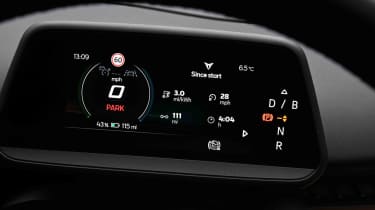
| Pros | Cons |
|
|
Charging at home is always the most cost-effective way to top up an EV, and for the launch of the Tavascan, Cupra has teamed up with Ovo Energy to make things even cheaper. Sign up for the plan, and drivers will be offered 10,000 miles' worth of free charging.
Even when that runs out, it will be possible to top up at 7p per kWh; based on the 3.3mi/kWh efficiency we achieved when we tested the car in the chilly early spring, that means 10,000 miles of driving would cost £212. Factor in warmer summer months when efficiency improves, and that cost should fall even lower. A petrol car averaging 40mpg and fuelled at £1.40 a litre would cost £1,591 over the same distance. But all this doesn’t compensate enough for the fact that the Tavascan is very pricey to buy.
Electric range, battery life and charge time
Our 3.3mi/kWh figure for the Tavascan came in cold weather and with a mix of urban, A/B-roads and motorway miles. If you do more low-speed and suburban driving, that figure will improve, and summer months will see the efficiency increase significantly, too, to the point that a 300-mile real-world range should be entirely achievable. Charging speeds peak at 135kW on each model, which isn’t as fast as some MEB-based cars, but still enables a 10-80 per cent top-up in 28 minutes.
| Model | Battery size | Range | Insurance group |
| Cupra Tavascan V1 | 77kWh | 337 miles | 34 |
| Cupra Tavascan VZ1 4Drive | 77kWh | 318 miles | 38 |
Insurance groups
Insurance groups are higher for the Tavascan than for rivals such as the Ford Capri, with the Cupra ranging from group 34 to 39.
Tax
The Tavascan’s three per cent Benefit-in-Kind (BiK) banding makes it a cheap option for company car drivers, although this rate applies to all zero-emission vehicles. The Cupra will also be eligible for vehicle excise duty (VED) road tax, with the high list prices meaning an annual cost of £620 for the first five years of paying it.
Depreciation
With three-year residual values estimated to vary between 46-49 per cent according to the trim level, the Tavascan is about average for the class. Rivals, including the Ford Capri and Renault Scenic, hold their value slightly better, but the Cupra’s depreciation figures are lower than for the majority of other VW Group electric vehicles.
Interior, design & technology
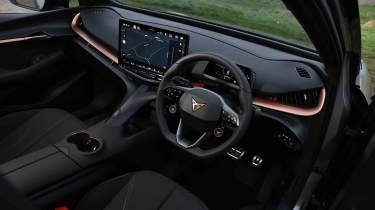
| Pros | Cons |
|
|
A striking design ensures the cabin is one of the most desirable in its class, while vastly improved infotainment tech makes the Tavascan far easier to recommend than Cupra models from even a couple of years ago.
Interior and dashboard design
When the Tavascan concept was first revealed to the public, its cabin matched the exterior for drama. The sweeping dashboard connected to the centre console through a floating Y-shaped central spine that looked like it had been beamed back from the future.
And the best news is that those concept looks have made it to the production car largely unchanged. Yes, the steering wheel isn’t trimmed in carbon fibre and shiny plastic, the digital instrument panel is a touch smaller, and the impractical white upholstery has been swapped for a more subdued shade, but the Cupra remains incredibly arresting inside.
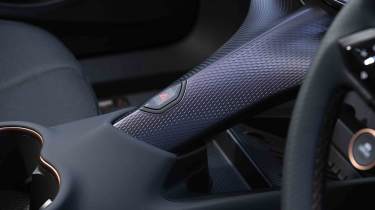
Materials and build quality
It’s hard to knock the fit and finish, too. The colours and materials look and feel classy, what limited physical switchgear there is appears fairly solid, and even where plastics are used, they don’t detract from the overall experience. Sustainable materials have been used in the upholstery, with textiles created from up to 90 per cent recycled polyester, while 50 per cent of microfibre materials come from recycled sources.
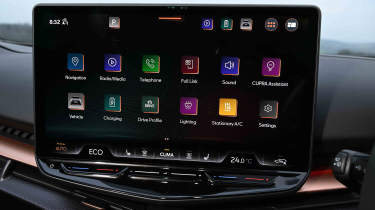
Infotainment, sat-nav and stereo
The Tavascan’s huge 15-inch touchscreen sits slightly awkwardly on top of the dash, but the system is fairly easy to use. Many of the foibles that affected early Borns have been ironed out, and the Tavascan’s system is much more intuitive.
It’s a shame that the climate controls are confined to the screen, but they’re fairly large and permanently positioned at the bottom of the display. Disabling the driver-assist systems can be applied to a shortcut that’s dragged down on the display.
Ahead of the driver sits a digital display that will be very familiar to anyone who has driven a Cupra Born, or indeed any of the other MEB-based products across the VW Group. It’s a little on the small side, but it displays only useful information; a button on the steering wheel can bring up more detailed trip and driver-assistance information.
Expert view, on design
“The Tavascan has a pretty unique flaw when it comes to forward visibility. Slim vents at the leading edge of the bonnet are designed to improve aerodynamic efficiency, but they have the side effect of funnelling road grime and water directly onto the windscreen in poor weather. Expect to get through plenty of washer fluid in the winter.” – Alex Ingram, chief reviewer, tested the Cupra Tavascan against the Ford Capri on UK roads
Boot space & practicality
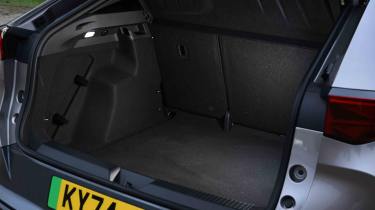
| Pros | Cons |
|
|
The overall wheelbase of the Tavascan is identical to that of its hatch sibling, the Born, but its taller roof and larger rear overhang make it the more spacious car overall.
Dimensions and size
While the Cupra Tavascan shares a platform with the Ford Capri and Skoda Enyaq, it’s slightly smaller than those two models, but it’s also slightly longer than the Volkswagen ID.4, too. A wheelbase that’s nearly 2.8 metres long is a match for those cars, and this means there’s decent space inside, if not among the class best.
| Dimensions | |
| Length | 4,644mm |
| Width | 1,861mm |
| Height | 1,597mm |
| Number of seats | Five |
| Boot space | 540-1,550 litres |
Driving position, seats & space in the front
Cupra has struck a great compromise with the Tavascan’s driving position, making it feel sporty and snug while still delivering the lofty feeling that SUV drivers find so appealing. The seat and steering wheel offer plenty of adjustment and comfort, and are great overall. Rear visibility is a little compromised by that rakish roofline and small rear window, though. Plus, it’s worse in wet weather because there is no rear wiper.
While the Tavascan still uses the fiddly touch-sensitive sliders that we’ve complained about in various Volkswagen ID products in the past, at least here they are backlit, so they can be used at night – a baffling oversight in some other early MEB-based cars.
A small shelf sits below the floating section of the dashboard, and a pair of cup-holders are located just ahead of a deep closed cubby beneath the centre armrest. Due to the position of the fusebox on the left side of the dashboard, the glovebox is very small, though.
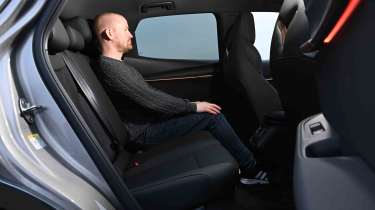
Seats & space in the back
Space in the back seats is very similar to what you’ll find in other coupe-SUV alternatives, such as the Ford Capri. The Tavascan has near-identical rear headroom and ever so slightly less knee room than the Ford, but the flatter rear bench makes it a little more comfortable when three people are sitting in the back – especially in models that don’t feature a rear centre armrest or through-loading hatch.
Boot space
At 540 litres, the Tavascan’s boot is a little behind the class best, but still very large. The area is a smidge under one metre square, and the rear seats fold down to leave an almost flat load space – at least they do if you go for a model with a false boot floor.
Expert view, on practicality
“There’s some extra storage under the boot floor for your charging cables, but as with other MEB models, there’s no front boot under the short bonnet, which is a shame.” – Jordan Katsianis, senior staff writer, drove the Tavascan on the European launch
Reliability & safety
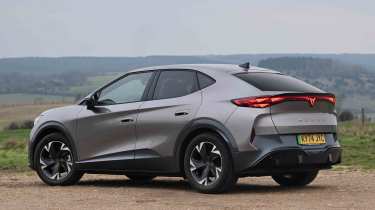
| Pros | Cons |
|
|
The Tavascan earned a full five-star safety rating from safety experts Euro NCAP in 2024. It matches the scores of the Ford Capri (which was tested in the same year) in the adult, child, and vulnerable road user categories, but the Tavascan outdoes the Ford for safety assistance.
The ‘always on’ functions, such as lane-keeping assist and traffic-sign assist, are typically intrusive, but they can be easily switched off via the touchscreen or a button on the steering wheel. Other active safety elements include active cruise control with lane-keeping assist, blind-spot monitoring and autonomous emergency braking, to name just a few.
Cupra had a mixed bag of results on the way to a below-average 18th place out of 32 manufacturers in our 2024 Driver Power survey. Owners loved their cars’ powertrains and interiors, but rated the infotainment technology and safety systems right at the bottom of the rankings in the annual poll, although the latter shouldn’t be a concern for Tavascan buyers.
Given Cupra’s slightly disappointing showing in the 2024 Driver Power survey, its saving grace is that the Tavascan comes with a five-year, 90,000-mile warranty.
| Key standard safety features | Euro NCAP safety ratings |
|
|
Buying and owning
- Best buy: Cupra Tavascan 77kWh V1
We’d keep things simple with the Tavascan and choose the entry-level model. It has a decent amount of kit, is more than quick enough for most, and it has the longest range.
Cupra offers a selection of service plans for its models, with the EV line-up cheaper than petrol or diesel range-mates. A plan is available for just a single service after two years, which costs from around £100. A four-year package, which includes an air-conditioning check-up, two MoTs and a discount on Cupra merchandise, is offered for around £530. Both of these can be paid for monthly to break down the costs.
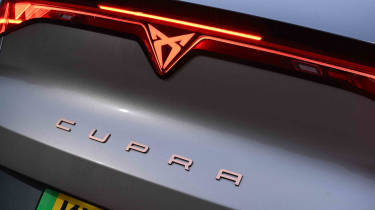
Alternatives
The obvious rivals for the Cupra Tavascan are from within the VW Group and include the Skoda Enyaq and Volkswagen ID.4 and Volkswagen ID.5, although like-for-like, these are all less expensive than the Tavascan. The Audi Q4 e-tron is actually closer to the Tavascan on price, but it’s a bit smaller all round. Non-VW Group options are the Ford Capri and Ford Explorer – although both use the same running gear as the Tavascan and are arguably more engaging to drive than their sporty rival. Then there are electric SUVs such as the Hyundai Ioniq 5, Kia EV6 and Genesis GV60 (all of which share the same running gear), the BMW iX1, BMW iX2, Mercedes EQA, Mercedes EQB and the Tesla Model Y.
Cupra Tavascan pictures
Frequently Asked Questions
In an effort to tempt buyers and offer extra peace of mind, Cupra now includes a five-year/90,000-mile warranty on all of its cars. In addition, the Tavascan’s drive battery and electric powertrain are covered for eight years or 100,000 miles, whichever comes sooner.
